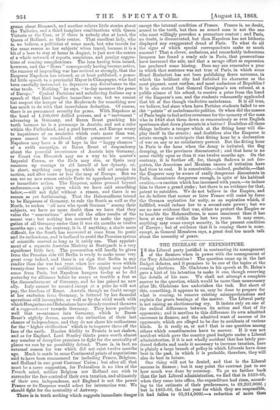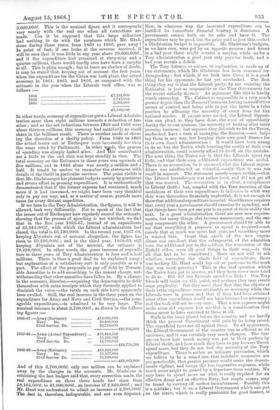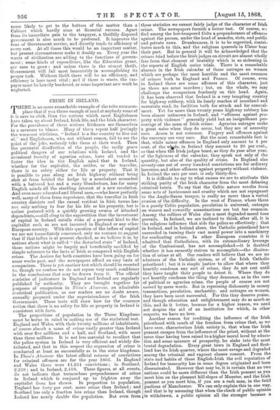THE DICREASE OF EXPENDITURE.
S the Liberal party justified in contrasting its management I. of the finances when in power with the management of the Tory Administration ? The question came up in the last. Budget debates, and it promises to be one of the topics at the coming elections. Mr. Gladstone in his speech at St. Helen's gave a hint of his intention to make it one, though reserving the details of his case. We shall not attempt a complete answer to the question, which would be more than unnecessary after Mr. Gladstone has undertaken the task. But short of this, something, it appears to us, may be done to prepare for what is coming, to remove existing misapprehensions and explain the grave bearings of the matter. The Liberal party is not raising an electioneering cry. It insists only on one of the radical differences between its action and that of its opponents ; and it ascribes to this difference its own admitted successes in finance, and the admitted want of success of its opponents, which are alleged to be due to accidents of various. kinds. Is it really so, or not ? that is one question among others which constituencies have to answer. If it was not accident which gave the country good budgets under a Liberal administration, if it is not wholly accident that has lately pro- duced deficits and made it necessary to increase taxation, here is plainly a large branch of policy in which Liberals have done, best in the past, in which it is probable, therefore, they will also do best in future.
One thing will not be denied, and that is the Liberal success in finance ; but it may point the contrast just to see- how much was done by economy. To go no farther back than the last Liberal administration, we find that in 1859-60, when they came into office, the expenditure had risen, accord- ing to the estimate of their predecessors, to 69,207,0001.; but in 1865-66, the last year for which they are responsible, it had fallen to 65,914,000/.—a reduction of more than 3,000,000/. This is the nominal figure, and it corresponds very nearly with the real one when all corrections are made. Can it be supposed that this large reduction had nothing to do with the surpluses which Mr. Glad- stone daring those years, from 1860 to 1866, gave away ? In point of fact, if one looks at the revenue received, it will be seen that it rose little in any year above 70,000,0001., and if the expenditure had remained at sixty-nine and a quarter millions, there would hardly ever have been a surplus at all. This is plain enough ; but to leave no shadow of doubt, it may be stated that, keeping out of account the first years, when the expenditure for the China war took place, the actual economy in 1861, 1865, and 1866, as compared with the estimate in the year when the Liberals took office, was as follows :-
1864 £2,151,000
1865 2,745,000 1866 3,293,000 X8,139,000
In other words, economy of expenditure gave a Liberal Adminis- tration more than eight millions towards a reduction of tax- ation; and as the net reductions between 1860 and 1866 were about thirteen millions, this economy had manifestly no small share in the brilliant result. There is another mode of show- ing the direction of a thrifty policy. From 1860 to 1866 the actual issues out of Exchequer were invariably less than the sums voted by Parliament. In other wads, the process of spending was sharply looked after. And -this contributed not a little to the end that was kept steadily in view. The total economy on the Estimates in these years was upwards of five millions, and in 1866 alone was nearly a million and a half. It would be useless to encumber the statement with details of the thrift in particular services. The point visible is that Mr. Gladstonegot his pleasant budgets mainly by persistent and severe effort in pruning expenditure. It is arithmetically demonstrated that if the former expense had continued, much more if it had increased, we might have been very thankful only to pay our way, and, as a matter of course, provide more taxes for every distant expedition.
If we turn to the Tory Administration, the figures, it will be allowed, look very differently. Not to speak of the fact that the issues out of Exchequer now regularly exceed the estimate, showing that the process of spending is not watched, we find that in the first year 1866-67, instead of an expenditure of 65,914,000/., with which the Liberal administration had closed, the total is 66,780,000/. In the second year, 1867-68, keeping Abyssinia out of account altogether, the figure has risen to 69,236,0001.; and in the third year, 1868-69, still keeping Abyssinia out of the account, the estimate is 70,428,000/. In other words, the gross increase of expendi- ture in three years of Tory administration is four and a half millions. There is thus a good deal to be explained away ; but explanation of a satisfactory sort is only possible as to a part. The effect of the proposals to pay off debt by Termin- able Annuities is to add something to the annual charge, not- withstanding that other annuities have fallen in. By a change in the accounts, likewise,—requiring the departments to debit themselves with extra receipts which they formerly applied to diminish the votes,—the totals on each side have apparently been swelled. Still, the real increase in the three years on the expenditure for Army and Navy and Civil Service,—the man- ageable expenditure,—is admitted to be very large. The nominal increase is about 3,700,0001., as shown in the follow- ing figures :— 1866-67 :—Army (Estimate)
Navy Do.
Civil Service Do.
1867-68 :—Army (Actual Expenditure) ... Navy Do. Civil Service Do.
1868-69:—Army (Estimate) £15,456,000 Navy Do. 11,177,000 Civil Service Do. 15,230,000 £41,863,000
And of this 3,700,000/. only one million can be explained away by the changes in the accounts. Mr. Gladstone in cnticizing the last budget said that, every correction made, the real expenditure on these three heads had risen from 38,165,0001. to 41,000,0001., an increase of 2,840,000l.; and Mr. Hunt was understood to admit an increase of 2,700,000/. The fact is, therefore, indisputable, and not even disputed.
£14,005,000 10,400,000 13,710,000 —x38,205,000 £15,418,582 11,168,949 14,183,063 £40,770,504
Now, in whatever way the increased expenditure can be justified, its immediate financial bearing is disastrous. A government cannot both eat its cake and have it. The expenditure may be good, but the price paid is just this,—that a Gladstonian budget is impossible. Mr. Gladstone's budgets, as we have seen, were got by an opposite process ; and hence in a bad year there might remain a surplus, while under a Tory administration a good year only pays for itself, and a bad year reveals a deficit.
The Tory defence, or excuse, or explanation is made up of two statements, which Mr. Gladstone has been censured for disregarding ; but which, if we look into them, it is a good. thing for his opponents he has yet overlooked. The first thing they say is that the Liberal party, by not resisting the Estimates, is just as responsible as the Tory Government for the recent unlucky finance. An argument like this is hardly worth answering. The Cabinet is responsible in a very much greater degree than the House of Commons, having more effective means of control, and being able to put the latter in a false position by affirming the necessity of every item for the national service. If excuse were needed, the Liberal Opposi- tion can plead, as they have done, the want of opportunity during the recent sessions, the necessity of looking after more pressing business ; but suppose they did wish to let the Tories, unchecked, have a turn at managing the finances,—not help- ing them in any way, but keeping their own good finance for their own direct administration ? It would have been wrong to do so, but the Tories, while boasting the merits of their own administration, could scarcely afford to dwell on the mistake. The next thing the Tories say is, that the Liberals spent too little, and that their own additional expenditure was useful. There is no accusation, be it observed, that the Liberal expen- diture was misdirected or wasteful,—only that it was too small in amount. The statement merely conies to this,—that the Liberal housekeeper was rather hard, and did not get all that was wanted. The accusation is. in effect, a compliment to Liberal thrift ; but, coupled with the Tory assertion of the usefulness of their own expenditure, it indicates in what way they were themselves financially neglectful. It is not enough to show that additional expenditure is useful. Good finance requires that every year a government should examine its spending, and that things have been got one year is no proof of their utility the next. In a great administration there are ever new require- ments, but many things also become unnecessary, and the one may compensate the other. A government should be able to say that everything it proposes to spend is required—not merely that so much was spent last year, and something more is wanted this. Grant that much of the new expen- diture was excellent, that the enlargement of the education vote, the additional pay to the soldiers, the conversion of the Enfield rifles, were all good things in their way,—is this all that had to be considered ? Have we not still to ask whether, surveying the whole field of expenditure, there was nothing Mr. Hunt could lop off or postpone to the work that was most pressing ? This is the real question which the Tories have got to answer, and they have never once tried to do so. But did the Liberals spend too little ? Our Tory friends will insist on this point, and perhaps they may create some perplexity. But they must show first that the objects of their extra expenditure were attainable or necessary while the Liberals were in power, and that if they had been attained
some other expenditure would not have become less necessary ; and the task will not be very easy. That a new expense might make some old expense less needful, is a consideration that seems never to have occurred to them at all.
Such is the issue placed before the country, and we hardly think the present Government will gain by its being raised. The superficial facts are all against them. To all appearance, the Liberal Government of the country was as efficient as its successor, and it was certainly very much cheaper. The tax-
payers know how much money was put in their pockets by
Liberal thrift, and how much they have to pay because Tones spend more, but they do not feel the necessity of the Tory
expenditure. There is rather an intimate persuasion, which
we believe to be a sound one, that indefinite economies are yet practicable, that greater pressure would make the depart- ments vigilant, and forego the less imperative expenses, while
much more might be gained by a departure from routine. We may have to spend more on what is really required for an
effective Army and an effective Navy, but ample means may be found by cutting off useless incumbrances. Possibly this is a mistake ; but if so, a Liberal Government which can put on the screw, which is really passionate for good finance, is more likely to get to the bottom of the matter than a Cabinet which hardly aims at financial success. Apart from its immediate gain to the taxpayer, a thriftily disposed government is also much to be preferred. It improves the tone of Government service, and directly tends to efficiency of every sort. At all times this would be an important matter, but present circumstances make it doubly so. Every year the wants of civilization are adding to the functions of govern- ment; some kinds of expenditure, like the Education grant, are sure to grow ; and unless there is the utmost thrift, Government will fail most lamentably in accomplishing its proper task. Without thrift there will be no efficiency, and efficiency is here most vital ; and if there is waste, the tax- payer must be heavily burdened, or some important new work be neglected.
































 Previous page
Previous page